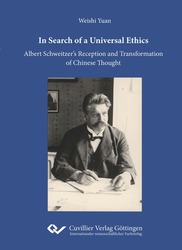| Areas | |
|---|---|
| Serie de libros (97) |
1382
|
| Nachhaltigkeit |
3
|
| Gesundheitswesen |
1
|
| Letra |
2372
|
| Medienwissenschaften | 16 |
| Teología | 57 |
| Filosofía | 102 |
| Derecho | 423 |
| Economía | 853 |
| Ciencias sociales | 417 |
| Ciencias del deporte | 48 |
| Psicología | 233 |
| Educación | 190 |
| Historia | 183 |
| Arte | 111 |
| Ciencias culturales | 166 |
| Literatur | 117 |
| Lingüística | 89 |
| Ciencias Naturales |
5408
|
| Ciencias Ingeniería |
1798
|
| General |
98
|
|
Leitlinien Unfallchirurgie
5. Auflage bestellen |
|
Erweiterte Suche
In Search of a Universal Ethics (Tienda española)
Albert Schweitzer’s Reception and Transformation of Chinese Thought
Weishi Yuan (Autor)Previo
Lectura de prueba, PDF (280 KB)
Indice, PDF (240 KB)
This book investigates Albert Schweitzer’s research on China, which first emerged in the 1910s and ended in 1939/40. Schweitzer’s China research evolved alongside the development of his “Kulturphilosophie” research for over a quarter of a century. In “Part I: In Preparation,” this book will mainly focus on the historical background against which Schweitzer formulated his Reverence for Life and established his networks with the China experts. In “Part II: In Progress,” Schweitzer’s periodic research outcomes, which were presented in several of his publications and manuscripts, will be studied. Subsequently, in “Part III: In Completion,” Richard Wilhelm’s translation of the Yi Jing, which lay down the fundamental principles for Chinese thought, Schweitzer’s final manuscript from 1939/40 under the title Geschichte des indischen und chinesischen Denkens, and his final depiction of Chinese thought will be given special attention.
The starting point for Schweitzer’s China research was his ideal ethical philosophy of Reverence for Life, which he formulated in the context of the decline of the Western civilization and was heavily shaped by his religious and philosophical convictions. Reverence for Life underscored humanistic concerns, and its ideals eventually became Schweitzer’s interpretative principles in his investigation of Chinese thought. Schweitzer was never a specialist in Chinese thought and Chinese civilization. Dependent on the research of European sinologists, his China research served to justify the necessity for Reverence for Life as well as of the methods for applying this new ethical philosophy. During his entire China research, Schweitzer made great efforts to critically interpret and transform the knowledge that had been conveyed by European sinologists such as Richard Wilhelm. Although in his final research Schweitzer had already seen great resemblance between classical Confucianism in China and his Reverence for Life, he did not ultimately manage to verify his assumptions. His final manuscript on Chinese thought from 1939/40 remained unpublished when he passed away in 1965.
| ISBN-13 (Impresion) | 9783736977150 |
| ISBN-13 (E-Book) | 9783736967151 |
| Formato | A5 |
| Idioma | Inglés |
| Numero de paginas | 316 |
| Laminacion de la cubierta | mate |
| Edicion | 1. |
| Lugar de publicacion | Göttingen |
| Lugar de la disertacion | Göttingen |
| Fecha de publicacion | 09.01.2023 |
| Clasificacion simple | Tesis doctoral |
| Area |
Ciencias culturales
Estudios anglisticos y americanos Lingüística extraeuropea, Literatura y estudios culturales ( incluyendo estudios religiosos) |
| Palabras claves | Albert Schweitzer, Richard Wilhelm, Ehrfurcht vor dem Leben, Reverence for Life, Ethik, ethics, Wille zum Leben, will-to-live, Evangelische Theologie, Protestant theology, Leben-Jesu-Forschung, the historical Jesus, Mystik, mysticism, Kulturphilosophie, philosophy of civilization, Weltanschauung, worldview, Lebensanschauung, life view, Weltbejahung, world-affirmation, Lebensbejahung, life-affirmation, Chinesisches Denken, Chinese thought, Sinologie, sinology, Yi Jing |
| URL para pagina web externa | https://www.uni-goettingen.de/de/%C3%96kumenische+theologie/56198.html |








